With over 140 scientists from 23 countries working across six groups and four Centres of Excellence, we have many stories to tell.
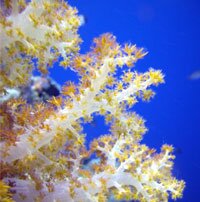 Planning underway for CRTR Phase Two
Planning underway for CRTR Phase Two
Planning is currently underway for Phase Two of the CRTR Program with a funding application under development. Phase Two will evolve the CRTR’s research with integrated activities in each region that will have direct implications for improved national and local policies, and management effectiveness, to sustain coral reef resources including attempts to buffer them from climate-related impacts. Activities will continue to build and enhance scientific and communication capacity within the targeted regions. The ecosystem services of fisheries yield, coastal protection, biodiversity and tourism have been defined as key issues to be addressed in Phase Two.
Read more
Spotlight on ecosystem-based management
In January 2010, the CRTR Australasian Centre of Excellence hosted two parallel events in Rarotonga, Cook Islands, focussed on ecosystem-based management approaches in the Pacific - a 12-day practical training course and a 3-day forum for senior natural resource managers.
Hear from participants
Read about the course and the forum
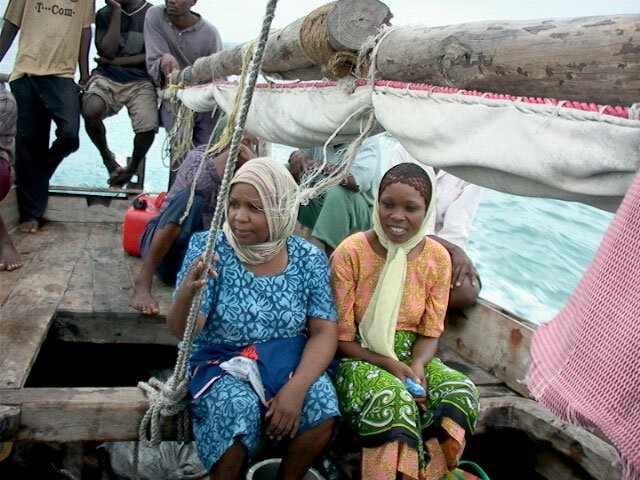 Taboos, customs have role in managing Tanzania’s reefs
Taboos, customs have role in managing Tanzania’s reefs
The Modelling & Decision Support Working Group (MDSWG) is building an interactive web portal to allow anyone to explore alternative futures for their coral reefs. The web portal is one of the main products of the CRTR Phase One modelling work and will provide an ongoing legacy of the Program by:
- Demonstrating the power of models to explore possible futures for Philippine and Mexican reef systems under different threats and management responses;
- Integrating data on the biophysical dynamics of coral reefs and the socioeconomic dynamics of the people who use them; and
- Allowing users around the world to input their own data and to generate predictions for their own reef systems under different management or threat scenarios.
Read more
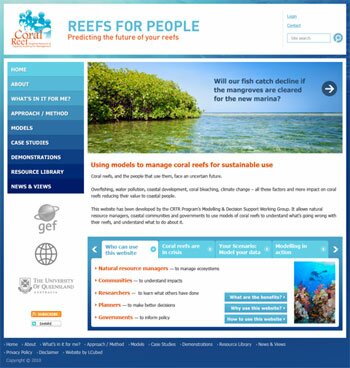 Reefutures.org - visualising alternative futures for coral reefs
Reefutures.org - visualising alternative futures for coral reefs
A major study of the role of indigenous customs and taboos in the management of marine resources along the coastline of East Africa has culminated in production of a landmark publication by the CRTR East Africa Centre of Excellence.
Read more
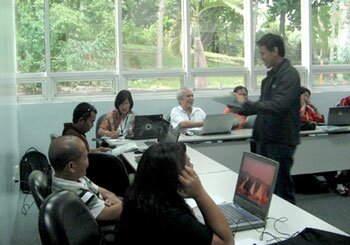 MDS scholars disseminate modelling tools at Philippines national workshop
MDS scholars disseminate modelling tools at Philippines national workshop
Modelling & Decision Support Working Group (MDSWG) students Deb Cleland, Rollan Geronimo and Jess Melbourne-Thomas presented their modelling tools at a national workshop on the application of ecosystem-based management (EBM) tools to coastal resource management in the Philippines this month.
The event was attended by more than 40 managers and policy makers from around the country, representing local governments, NGOs and regional-level management groups. The workshop provided training on different EBM tools, determined larger-scale applications of these tools, and gathered concrete support and commitments for “finding a way out for subsistence fishers in depleted fisheries in the Philippines”.
Read more
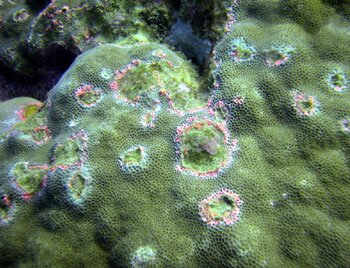 Japanese reefs show northernmost distribution of coral diseases
Japanese reefs show northernmost distribution of coral diseases
Last spring, I was invited by Drs. Yoshimi Suzuki and Beatriz Casareto from the University of Shizuoka to give seminars and to survey reefs in the Ryukyu archipelago. The surveys were mostly to look for coral diseases and diseases in other sessile reef organisms.
Read more
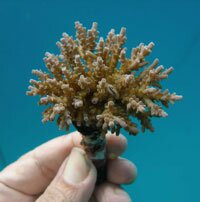 Pegs post promise in restoration
Pegs post promise in restoration
The potential of a "coral peg" for assisting reef restoration using sexually-reared corals has been demonstrated, based on results from a pilot experiment in Japan. Adopting an approach suggested at a CRTR Restoration and Remediation Working Group workshop, Japanese researchers started pilot-testing 200 pegs during June 2007.
Restoration & Remediation Working Group
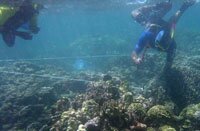 Common Sampling across Centres of Excellence
Common Sampling across Centres of Excellence
The ecological sampling, or common sampling project as it is more commonly known, is designed to implement a set of key monitoring techniques to assess the dynamics of coral populations and associated coral reef organisms. The project seeks to define key ecological processes that regulate the coral populations across the CRTR's four regional Centres of Excellence, which can be replicated across the globe.
Bleaching Working Group
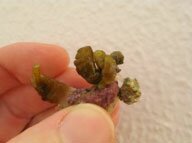 Searching for secret Symbiodinium
Searching for secret Symbiodinium
For millions of years, Brazil's coral reefs have been geographically separated from the Pacific Ocean by the Isthmus of Panama and from the Caribbean Ocean by the estuary of the Amazon River.
Bleaching Working Group
Geographical diversity of Symbiodinium
Research into the geographical diversity of Symbiodinium has found different strains in approximately 800 coral species from Zanzibar, Thailand and surrounding regions. Early results from DNA extractions, PCR-DGGE analyses and DNA sequencing of the 550 coral samples from the under-studied Thailand region indicate many new and unusual coral-algae symbioses. While a definitive assessment of how water quality affects these associations is premature, many of the same species of symbiont are being found at mainland and island locations. For more information, see Bleaching Working Group
Post-settlement bottlenecks
Coral is most vulnerable in the first year of settlement, with mortality exceeding 90% on the Mesoamerican Barrier Reef. However juvenile corals that make it through to a size refuge of about 40mm have much more promising prospects with an estimated 75% chance of long term survival. For more information: Connectivity Working Group
Impact of fish farms on coral health
Effluent from coastal fish farms has been linked to reduced water quality and increased abundances of micro-organisms in the water column. Therefore aquaculture may play a role as an incubator, conveyor and facilitator of disease into natural populations. As part of its study of the impact of local environmental factors on coral health, the DWG has found that the fish pens in Bolinao Bay (Philippines) have a strong influence on the bacteria population, nutrient input, primary production and the patterns of energy and carbon flux in the surrounding waters. For more information, see Coral Disease Working Group
ReefGame
The Modelling and Decision Support Working Group has developed the next generation of an agent-based participatory modelling game – ReefGame. A recent workshop at the Marine Science Institute’s Bolinao Marine Laboratory was attended by fishing families, barangay captains and Government officials, the novelty of the process resulted in greater sharing of ideas and experiences by the fishers compared to traditional questionnaires. For more information, see Modelling Research Group
More stories coming soon!